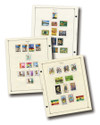
# MCC386 - 1957-2001 Ghana
Ghana collection contains 584 stamps with about 60 Scott album pages. Nearly equal mix of mint and postally used stamps with some complete sets. Mostly Regular Issue stamps with several souvenir sheets, including #389a. Also features Airmail and Postage Due stamps.
Ghana is located on the coastline of western Africa, on an area of the Atlantic Ocean known as the Gulf of Guinea. The climate is tropical, with an average temperature above 80 degrees Fahrenheit. Most of the country receives between 40 and 60 inches of rainfall a year, although areas in the north and northeast experience a dry season from November to March.
This nation's name (pronounced GAH nuh) is taken from the Ghana Empire, which was located in what is now Mauritania and Mali. Dating back to the 300s AD, this wealthy state was a center for traders, merchants and skilled craftsmen. Before the empire's end in the 11th century, it became engaged in the slave trade. Many of the enslaved peoples came from the area that is now Ghana.
Ghana's first settlers migrated from kingdoms in the northwestern portion of the African continent. European influence began in 1471 when Portuguese explorers arrived. These explorers found the land to be so rich with gold they named it the Gold Coast. In 1642 the Dutch took over all the holdings the Portuguese had established. The brutal slave trade of the 1600s attracted more European powers to the area. In the 1860s it was abolished. From that time forward Great Britain took control of the country, eventually establishing a colony there in 1874. Slowly Great Britain allowed the Africans more freedom and self-rule. In 1957 complete independence was granted, and Gold Coast became known as Ghana.
Today Ghana is back in the hands of the ancestors of its original inhabitants; 99 percent of the people are black Africans. Of these people there are approximately 100 different ethnic groups. African languages and English are spoken. A majority of Ghanaians, about 45 percent, practice traditional African religions, followed in popularity by Christianity and Islam. Ghana has one of the best educational systems in Africa. Primary and secondary levels of education are mandatory and free to all children, and there are three universities.
Agriculture plays an important role in Ghana's economy. The main crops are cacao seeds (used to make chocolate), coffee beans, coconuts, kola nuts, and palm seeds or kernels. Many tropical hardwoods, like mahogany, are harvested from Ghana's forests. Ghana also has a wealth of mineral resources including large deposits of bauxite, diamonds, gold, and manganese.
Ghana is a nation emerging from a troubled past. The combination of its natural resources, growing industry, and dedication to education are sure to bring about economic success.
Ghana collection contains 584 stamps with about 60 Scott album pages. Nearly equal mix of mint and postally used stamps with some complete sets. Mostly Regular Issue stamps with several souvenir sheets, including #389a. Also features Airmail and Postage Due stamps.
Ghana is located on the coastline of western Africa, on an area of the Atlantic Ocean known as the Gulf of Guinea. The climate is tropical, with an average temperature above 80 degrees Fahrenheit. Most of the country receives between 40 and 60 inches of rainfall a year, although areas in the north and northeast experience a dry season from November to March.
This nation's name (pronounced GAH nuh) is taken from the Ghana Empire, which was located in what is now Mauritania and Mali. Dating back to the 300s AD, this wealthy state was a center for traders, merchants and skilled craftsmen. Before the empire's end in the 11th century, it became engaged in the slave trade. Many of the enslaved peoples came from the area that is now Ghana.
Ghana's first settlers migrated from kingdoms in the northwestern portion of the African continent. European influence began in 1471 when Portuguese explorers arrived. These explorers found the land to be so rich with gold they named it the Gold Coast. In 1642 the Dutch took over all the holdings the Portuguese had established. The brutal slave trade of the 1600s attracted more European powers to the area. In the 1860s it was abolished. From that time forward Great Britain took control of the country, eventually establishing a colony there in 1874. Slowly Great Britain allowed the Africans more freedom and self-rule. In 1957 complete independence was granted, and Gold Coast became known as Ghana.
Today Ghana is back in the hands of the ancestors of its original inhabitants; 99 percent of the people are black Africans. Of these people there are approximately 100 different ethnic groups. African languages and English are spoken. A majority of Ghanaians, about 45 percent, practice traditional African religions, followed in popularity by Christianity and Islam. Ghana has one of the best educational systems in Africa. Primary and secondary levels of education are mandatory and free to all children, and there are three universities.
Agriculture plays an important role in Ghana's economy. The main crops are cacao seeds (used to make chocolate), coffee beans, coconuts, kola nuts, and palm seeds or kernels. Many tropical hardwoods, like mahogany, are harvested from Ghana's forests. Ghana also has a wealth of mineral resources including large deposits of bauxite, diamonds, gold, and manganese.
Ghana is a nation emerging from a troubled past. The combination of its natural resources, growing industry, and dedication to education are sure to bring about economic success.







